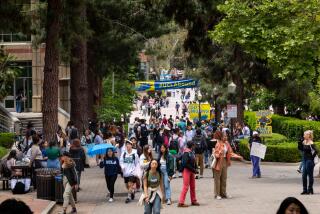SOUTHERN CALIFORNIA JOB MARKET : THE DRIVING FORCES : Has the Time Come for ‘80s-Era Greed to Drop Off the Board?
- Share via
The Roaring ‘80s--the decade of ambition, of excess and, yes, of greed--is finally ending.
It is ending a few weeks after the calendar actually turned, and not with a bang but with a bankrupt thud: The demise of Drexel Burnham Lambert--the money machine largely responsible for driving junk bond takeover mania--gives the dawn of the decade the feel of a bank vault slamming shut.
These days, a real-life Gordon Gekko--the supremely glamorous yet corrupt investor in the 1987 movie “Wall Street”--would have a tough time finding enough killer deals to keep busy. There is no early ‘80s, Ronald Reagan-style tax cut in the offing to provide a cash bonanza for masses of American consumers. And everybody is sick of yuppies.
“The zeitgeist of greed that really defined the 1980s has become shopworn, a little tired,” said William Schneider, a political analyst at the American Enterprise Institute in Washington. “But I don’t sense anything new that is coming to replace it yet.”
For social seers, the big question appears to be: What follows an era of indulgence?
Will America’s most ambitious graduates become more eclectic, less focused on Wall Street and a handful of other platinum-plated professions, more willing to experiment? Will manufacturing, for instance, come back into business school vogue in time for American industry to stave off the Japanese? Is it possible that--gasp--idealistic values will come back into fashion?
“The trend we see is that they (students) want to do something for others,” said Deborah McCoy, director of UC Riverside’s Career Service Center. “They want to make a meaningful contribution.” McCoy, for instance, sees growing interest in ethical issues among business students.
That’s not surprising, perhaps, in light of the imprisonment of super-rich investor Ivan Boesky or the more recent legal difficulties of financial wizard Michael Milken.
This much appears certain: The high-powered, high-finance jobs that became cultural symbols of the past decade--and potent lures for a generation of graduates--will be far less plentiful in the early 1990s.
Already, the headlines are full of the painful contraction on Wall Street, such as last week’s notice by Shearson Lehman Hutton that 2,000 employees are about to get their walking papers. Many observers believe that in the glamorous and wealth-creating investment banking field, the crunch is just beginning.
“The junk bond business is drying up,” said George Monahan, director of industry studies for the Securities Industry Assn., a trade group.
Phones along Wall Street are ringing off the hook as traders and brokers search for more stable employment. Drexel Burnham’s collapse has left thousands of employees scrambling for jobs and created enormous uncertainty about the future of other firms that relied heavily on junk bonds.
Yet employment prospects in financial services have soured far beyond Wall Street. Scandals and huge losses have hurt job prospects at many savings and loans, for example. But it is Wall Street, which has lost at least 40,000 jobs since 1987, that has suffered the most visible and dramatic decline.
For youthful job seekers, the message is stark: “There’s a recognition on Wall Street that one can no longer get rich just by getting an MBA and putting in 90 hours a week,” said Joan Zimmerman, executive vice president of GZ Stephens, a New York executive search firm that specializes in the financial community.
“Investment banking will go back to the way it was before the 1980s: People will have apprenticeships at the start of their careers.”
Layoffs also have hit virtually every major brokerage firm, due to the long decline in “retail” volume, the stock purchases that individual investors make. Some 14,000 retail stockbrokers have lost their jobs since the crash of October, 1987, the Securities Industry Assn. reports. And Wall Street still is believed to have 25% more employees than it needs.
Even those who retain investment jobs have lost some of the rewards they enjoyed at the peak of the opulent ‘80s. Year-end bonuses for investment bankers were down roughly 25% last year.
Ironically, one of the few growth areas on Wall Street may come from the need to fix the many ailing leveraged buyouts and other junk-laden corporations. Many of those who helped put those fragile deals together may find work helping the firms straighten out their balance sheets in order to survive the 1990s, some recruiters say.
To be sure, the grim job outlook in the financial services industry hasn’t been lost on business school students, who understand the laws of supply and demand as well as anyone.
“The pipeline is drying up on both sides,” said Doyle Lyons, an analyst at Merrill Lynch who follows the securities industry. “There is less hiring, and fewer MBA students are interested.”
At Stanford’s Graduate School of Business, for instance, the number of graduates taking jobs in investment banking fell from 23% of the Class of 1987 to 7% of the Class of 1989, according to spokeswoman Cathy Castillo.
“Those that are interested in investment banking are finding good jobs, but there are just not as many of them,” she added.
Nor is there any one field that students are flocking to instead of investment banking. That old standby of business school graduates--management consulting--remains hot, ranking first among Stanford graduates, with 16% of them taking consulting jobs in 1989.
In general, students seem to be weighing a more diverse array of possibilities than their predecessors did in the go-go 1980s, according to Maureen McNulty, director of Stanford’s career management center.
“First-year business school students looking for summer jobs are looking at a broader range of activities,” McNulty said. “Management consulting is still No. 1, but manufacturing is stronger than it has been.”
Careers in real estate investment also seem to be attracting more business school students, despite the uneven housing market in Southern California, which ranges from sluggish in the San Fernando Valley to brisk in the Antelope Valley and the Inland Empire.
The San Fernando Valley Board of Realtors reports that it has attracted more than 1,000 new members--realtors and their associates--in the last year. “We haven’t noticed any slowdown at all” in membership, board staffer Susan LeRoy said. ‘We’re getting just as many new applications for membership as we were getting before,’ ” she added.
Yet those realtors are splitting up a smaller pie than existed just a year or two ago, and many marginal brokers may not last much longer. In January, realtors sold 287 fewer existing houses in the San Fernando Valley than they did a year earlier, a 27% decline, and more than 10,000 homes in the region remained unsold on the market.
“A lot of people aren’t buying because no one knows where the bottom is in Southern California real estate right now,” said Alex Auerbach, a spokesman for the Los Angeles Board of Realtors, which represents, among other areas, the city’s affluent Westside.
With so many get-rich professions seemingly not quite as alluring as they once were, what is there for a young go-getter to do in the 1990s?
Many erstwhile Wall Streeters will, of course, go into corporate America or management consulting. And in a more closely knit global economy, international business and entrepreneurship are likely to provide new opportunities.
Yet there also are clues that business in general may be losing some of its luster among students these days. Interest in business careers among those entering college last fall fell to the lowest level since 1983, according to the annual survey of college freshmen by UCLA’s Higher Education Research Institute.
Moreover, a growing number of students may be gravitating toward fields that reflect non-financial values, such as environmental science and counseling, McCoy of UC Riverside maintains. It even seems possible that graduates in the 1990s will show greater interest in public service, a surprising epitaph to a decade that glamorized greed on magazine covers.
Laina Warsavage, a project coordinator for Campus Compact, a group that encourages public service work at 230 colleges, said: “I think students are seeing other opportunities.”
More to Read
Inside the business of entertainment
The Wide Shot brings you news, analysis and insights on everything from streaming wars to production — and what it all means for the future.
You may occasionally receive promotional content from the Los Angeles Times.









